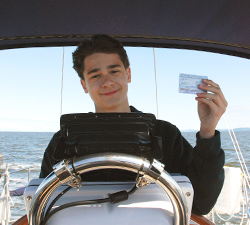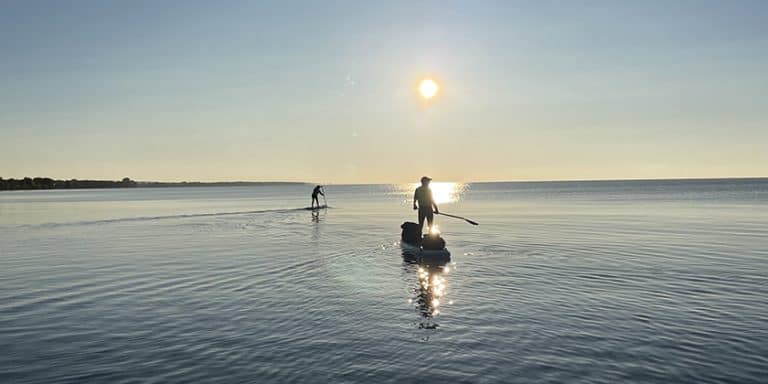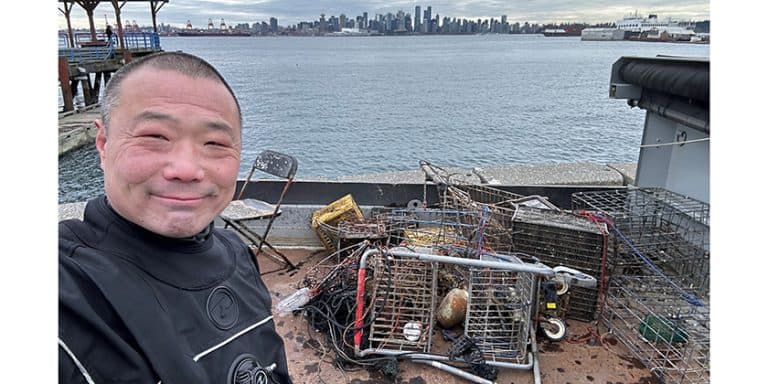Passing the First Test

By John Kelly
For an eager and experienced 14-year-old, passing the boater competency exam is just the first step in a lifetime of learning on the water.
One of the toughest tests I have ever written wasn’t even at school. It was the pleasure craft competency exam.
In contrast to the 30 minutes of studying I usually do for one of my grade eight exams, I spent weeks preparing for my boating exam. Every night during the weeks leading up to the exam, I would review a chapter in the study guide. I even took the guide to school with me to read when I had the chance.
I have been boating my entire life, thanks to my parents who have always had a sailboat. They owned a Spencer 35 sailboat for many years before I was born, and I made my first crossing of the Strait of Georgia when I was only three months old. Now, 14 years later, I often get to helm our boat when we are out sailing, of course with my father (a CYA-certified instructor) nearby. My favourite part is steering the boat out of an anchorage, if the weather permits.
But despite my experience, I had avoided the boating exam, even though there is no age restriction for writing the test. I finally took on the challenge of getting a Pleasure Craft Operator Card this year. I began studying for it at the Vancouver Boat Show in February, where my dad bought the study guide, knowing that if he got me started, I would see it through.
Tough Questions
The first thing I did was take the practice exam at the back of the book. I figured the test would not be difficult, just questions about right of way and buoys, and the first question confirmed my assumption: what is the front of the boat called? But the next few questions quickly demoralized me: What is the minimum number of seats required on a vessel towing a water skier? What is the maximum lifespan of a flare? (Answers: three seats and four years).
Skimming through more of the book, I found the material more confusing and frustrating. There was an entire graph dedicated to the various cardinal buoys, their lights, and what they mean. It seemed impossible to memorize everything.
One of my father’s boating friends, Gordon, also took the test recently and although he has been boating for more than 50 years, he found the material tough. He warned me to read the questions carefully: one word could change the entire meaning of a question.
After a month of diligent studying and review, I decided to finally write the online exam. To my surprise, I still couldn’t take it. To write the exam I still needed to spend three hours reviewing the online study guide and pass a quiz for each chapter to show that I understood the material in the chapter. If I failed a quiz, I spent another 20 minutes reviewing the chapter again. Fortunately, I failed only one quiz, and the question that stumped me was: What type of fire extinguisher are you required to have on a motor boat? The options were Type A, B, C or D. (Answer: B)
When I took the exam, the fire extinguisher question reappeared, and Gordon was right – a few questions did slip a “not” into them, some of which I nearly missed.
My final score was 88 percent, coincidently the same as Gordon’s, who joked that that must be the highest score possible. I eagerly printed off my temporary licence, as the permanent PCOC would arrive in four to six weeks. It was the first card I’ve ever had that was a legal certification of competency. It felt like I had my driver’s license, only better: after all boating is a lot more fun for getting around. But I've just passed the first test. Boating is a lifelong learning experience – nobody truly knows everything that could happen on the water.
I had dreams that night of zipping across the water in a dinghy, and frantically unfurling a sail as it plumed into its full majesty.
John Kelly cruises the West Coast with his family on their Tayana 48 Perfect Bound.
Notes:
• Proof of operator competency is required for anyone operating a recreational (non-commercial) boat with a motor in Canadian waters (other than the waters of Nunavut and Northwest Territories), regardless of the operator’s age. For details, visit www.tc.gc.ca/eng/marinesafety/debs-obs-paperwork-paperwork_operator-360.htm.
• When you are preparing to write the boating competency exam, I would recommend taking the chapter quizzes because they test you with samples of the questions on the full exam.
• Another key point – which I neglected – is not to ignore the graphs and illustrations about lights, buoys and equipment. You can expect to be questioned on them. I had to guess at a few of the graph questions, since I had assumed they wouldn’t expect you to memorize them.
• Remember that there is no trick or easy way to pass the exam, apart from studying and reading the questions carefully.
Good luck and good boating!
PHOTO: Legal! John Kelly displays his new Pleasure Craft Operator Card at the helm of the family sailboat. Photo Credit: William Kelly




























